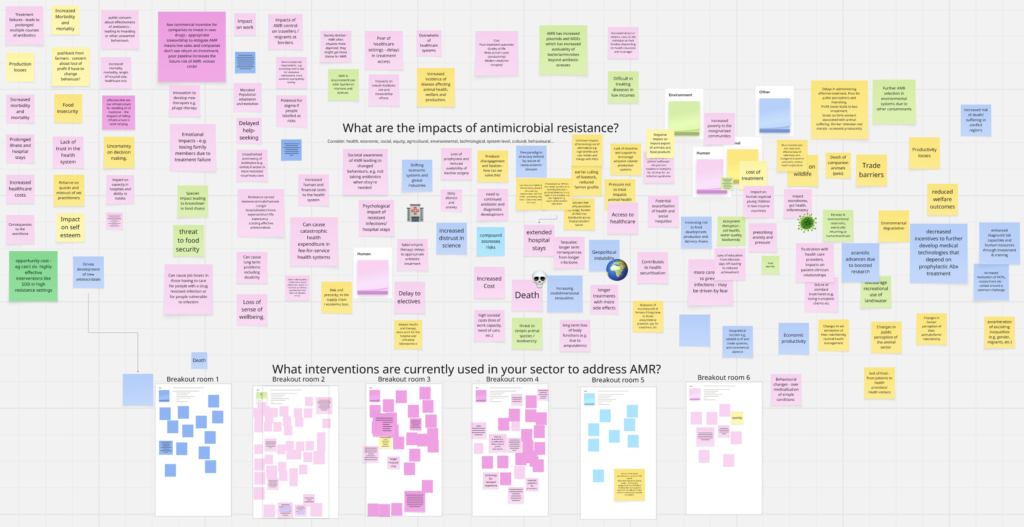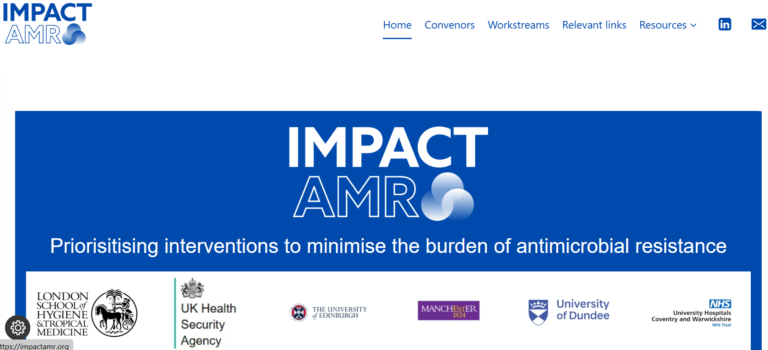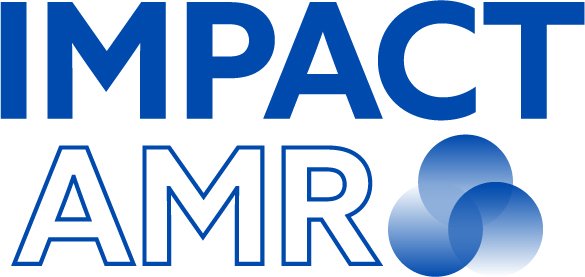IMPACT AMR Workshops
The IMPACT AMR Network held three workshops in May and July 2025, with over 100 participants joining the interactive sessions.
The sessions gathered together experts across three sectors, humans, animals, and the environment, with a variety of perspectives, such as academia, medicine and veterinary medicine, public health, epidemiology, modelling and policy.
Workstream 1 workshop: impacts of AMR interventions
Prof Julie Robotham, lead of Workstream 1 led the workshop together with Kristina Aluzaite on the 7th of May 2025. The workshop aimed to initiate multi-stakeholder discussions on defining impacts of AMR and AMR interventions. Participants were encouraged to think broadly and expand thinking from the ‘usual’ impact metrics. From an initial brainstorm of AMR impacts, participants then considered a variety of interventions across sectors, sharing potential intended and unintended impacts, thoughts on who may be impacted and over what timescale. Participants engaged in open discussions as well as in interactive activities, both within sectors and sharing learning cross-sectorally. These discussions have been summarised to generate categorised impacts by sector, alongside capturing wider considerations for research and decision-making. Further, given the differing perspectives, the workshop catalysed onward discourse on how best to bring together diverse ways of thinking about AMR and impact metrics from human, animal and environmental sectors.
Workstream 2 workshop: Transdisciplinary prioritisation framework
Prof Dominic Moran, led a workshop on intervention prioritisation on the 16th of May 2025. The workshop introduced approaches to prioritisation of interventions and challenged attendees to consider alternative prioritisation methods and frameworks as well identifying criteria to prioritise AMR interventions across different sectors. These include intervention impact, its costs and other potential behavioural and political barriers. Participants also engaged in interactive activities, with three online simultaneous spaces to share their experiences and expertise. The workstream will be synthesising this information and other feedback to develop an output on framework development.
Workstream 3 workshop: Case studies and evidence mapping
Dr. Laura Richards, Dr. Benjamin Parcell, and Dr. Steven Montgomery-Laird, co-leads of WS3, ran a workshop on the 3rd of July 2025. This session aimed to establish a common ground regarding the definition of case studies that could be used to develop and test the prioritisation framework. The group provided two illustrative examples: bacterial vaccination against Streptococcus pneumoniae and Water, Sanitation, and Hygiene (WASH) with an environmental perspective. During the interactive session, the leads encouraged the participants to brainstorm about impactful case studies that can be developed as part of collaborative efforts supported by the core team of IMPACT AMR. The activity took place in three online simultaneous spaces. The workshop allowed IMPACT AMR to understand ideas for cases currently being worked upon in real time. The aim of the workshop was to make sure participants understood our definition and structure to a case study but also the collaborative discussion in the network allowed people to generate further ideas which we endeavour to explore.

Image 2: goals of Workstream 3 to achieve over the course of IMPACT AMR
Next steps
The leads of the different WSs are currently working on collating and processing insights shared during the sessions with the aim of progressing each workstream to the next step. Participants at each workshop, along with members unable to attend, will be invited to provide further inputs into the next steps for each workstream.





